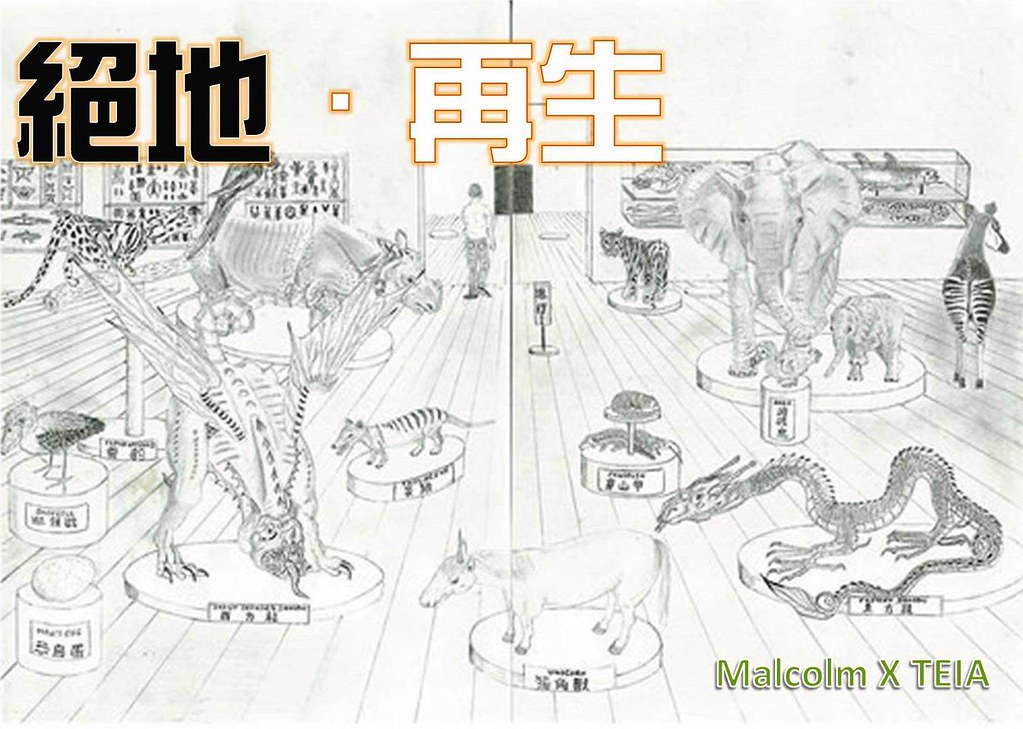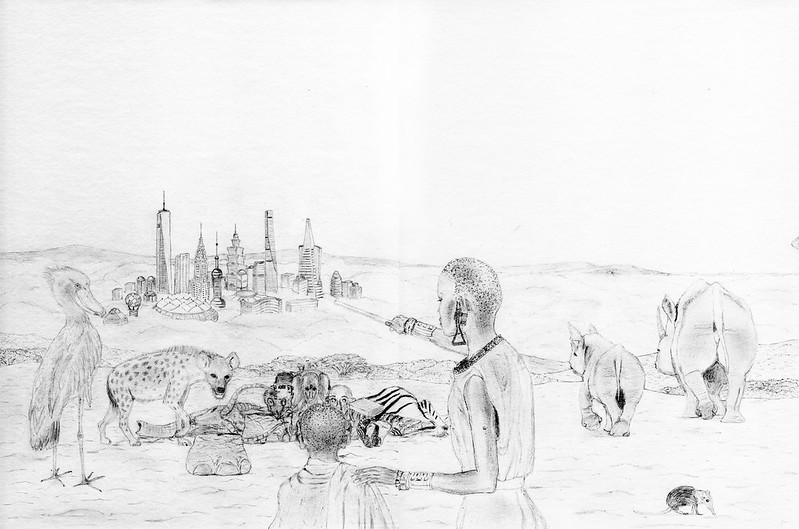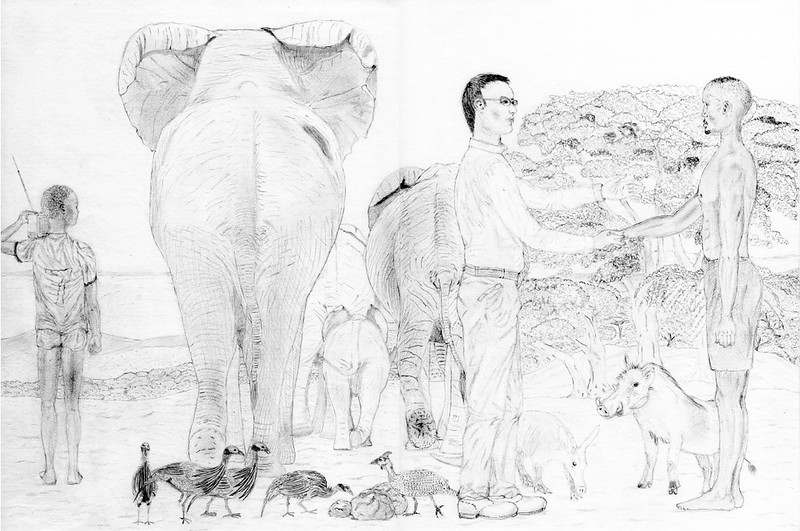
在經濟全球化的發展下,我們應該更重視與人類同居於這個星球上的其他生命。
隨著人類對自然資源的需求量日益增加,以及許多時刻變化的新經濟型態出現,國際間對自然資源的爭奪也不斷升溫,世界各國爭搶化石能源、木材、礦物,甚至水資源。
這樣的現況,無疑使人們越發意識到永續經營自然資源的重要性,也使人們採取更多行動,實行資源回收利用,以及落實能源使用最佳化。
即便如此,尋找新自然資源的壓力仍未減輕。隨著科技的發展,我們抽取頁岩天然氣、深入海底探勘海床的甲烷水合物和錳核,人類掠奪大地資源的前線不斷向地球的各個角落推進,威脅著攻破這個星球上生物多樣性的最後堡壘。
尤有甚者,當非洲大陸加速融入全球經濟之時,卻讓曠野上的大型動物面臨嚴重危機;而亞洲僅存擁有獨特生物多樣性的雨林,也承受著巨大的壓力。這些景況,在在都兆示著人類對環境資源的短視近利、竭澤而漁。
瀕臨滅絕的物種和它們的棲地往往併行受迫,是國際貿易的受害者。各國家政府只在意貿易帶來的金錢收支平衡,卻將經濟活動產生的環境赤字拋諸腦後。
人們應徹底了解經濟活動所帶來的環境衝擊,並將此作為任何國際間貿易協定的先決條件,讓大眾了解事實。我們至少應研究獲取自然資源(木材、礦物、化石能源)對生物棲地帶來的衝擊,以及明訂政策或措施,以保生態系長存。
人類不應將其他物種視為可剝削利用的商品,它們是地球上的瑰寶,值得受到保護、留存給後世。
如今的社會中,已將非法交易瀕絕物種視為和走私毒品一般嚴重,它們使地下經濟猖獗,走私瀕絕物種還會削弱國家政府的管制力。舉例來說:象牙走私已儼然成為恐怖主義民兵的提款機。
不論是動物或植物,珍稀物種的合法買賣往往引發非法交易:人們不付一毛的掠取自然中的珍稀動植物。
為了增進人類的福祉而利用自然資源和其他物種,是看似合理的方法,但隨著世界人口不斷上升,如何永續綿延人類所需,就是一項新的挑戰。人類絕對必須突破窠臼,重新評估什麼才是生活必需品,並加倍關注週遭環境。
作為一個21世紀負責任的公民,讓我們站出來為其他生命發聲,支持如下的信念:野生動植物不應淪為全球化的另一項商品。
A Western Perspective on the Issue of Species Conservation
- Self Introduction
I was raised in a family with a long tradition of interest in biology and medicine, especially on my father’s side. From a very young age, I was encouraged to observe nature and learnt how rewarding it was.
Graduated with a Major in Air & Space, I worked for 14 years as an engineer in the Aeronautical Industry. However, keeping a strong interest in nature, I decided to take a professional break for one year to get a Master’s Degree in fundamental Ecology.
Simultaneously, I have been an avid traveller, visiting Taiwan for the first time in 2010 and coming again in 2014 to learn Chinese.
I have always been struck by how western and eastern landscapes shaped by humans differ so much.
Visiting East Asia and the island of Borneo induced me to further consider how different civilisations perceive their environments. I kept on questioning this issue when I came back to France. I could not help imagining how a French landscape would be shaped differently had it been shaped by people of Chinese culture. Would East Asian nations consider that a French rural landscape is underdeveloped because we keep patches of forests and grasslands without farming them?
This is the perfect illustration that our connection to the Environment differs.
Some western and eastern nations have a legacy of colonial history. My point here is not to start a debate about it. Colonists would often label human societies as underdeveloped because of the richness of their environment and the fact that, at first sight, many resources, should they be minerals, timber, land or fauna, would be kept unused.
As of 2014, we are still putting different societies on a scale of value, with the obvious assumption that we are on its top since we assess other societies according to our own values.
Despite hunters-gatherers societies having managed to keep a relatively high biodiversity in their environments until today, we still deem them as inferior. On the contrary, we, “developed societies” have not been able to manage our environment in a sustainable way, hence an increasing pressure we are putting on remaining biodiversity. Even worse, realizing how valuable it is, we are more and more tempted to give Biodiversity a pure financial value. I am convinced this thinking process is a dead-end as it merely accelerates the extinction of the rarest species.
We definitely have to go back to the spirituality deeply rooted in each of our societies to find the answers. We just have to scratch the surface to understand how this spirituality is universal and is the intimate link that often connects us to our environment and its life.
As an example, South Korea is often quoted as the most wired country in the world. However, Shamanism, a ritual practice that connects living people with spirits is still widely followed during important events. This practice is a common heritage Koreans share with hunters-gatherers of Siberia. Shamanism of Siberian traditional societies includes rites aimed at keeping a good balance between humans and their environment, including a sustainable supply of food.
Chinese proverbs are the result of thousands of years of observation. They contain many clues about the environmental issues we are facing.
Strangely, one particular saying immediately came to mind as I started this project. And it was interesting to discuss it with people of Chinese cultural background to see how my western interpretation was different.
揠苗助長
Pull up Sprouts to Help Them Grow
I consider this story as the perfect illustration of the “threshold” issue: Is there a real long term benefit to getting more by constantly sampling more? Is a civilization that manages to get more from its environment a successful society? How are we actually able to detect that our sampling becomes unsustainable?
I was particularly surprised to see a documentary about Sichuan orchards. In some areas, farmers have been replacing bees to pollinate apple flowers for two decades. If only they could read again their old classics…
Through these pages, my aim is to begin a dialogue about cultural references in a changing world. For the first time in the human history, we have the ability to communicate instantly. This allows us to see that environmental issues and loss of biodiversity need to be jointly addressed.
However, how can we reach a common ground to protect our natural environment? How far can each of us go in the exploitation of our local environment? How fair is it to sample other societies’ natural heritage while we have not been able to secure ours? Can we have the wisdom to stop before it is too late?






